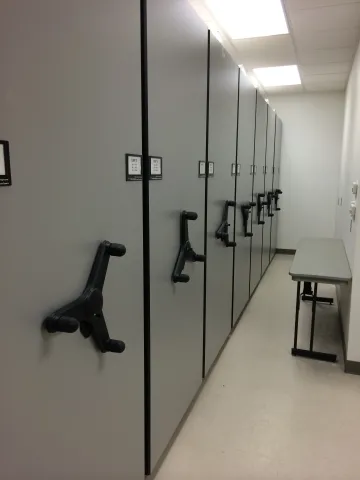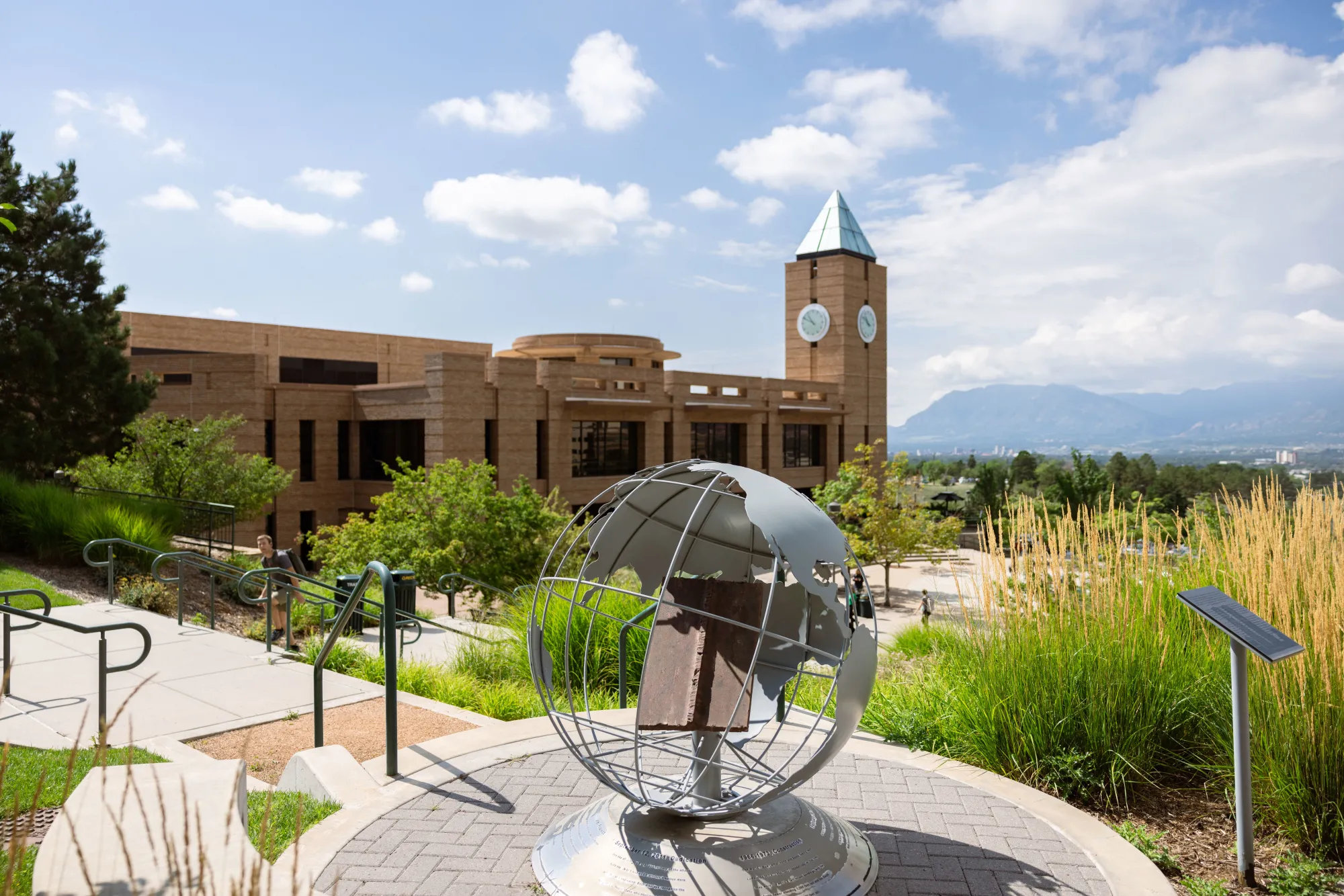
Cultural Heritage and Environmental Resource Management
Masters of Arts (MA)- Program Delivery
- On Campus, Online, Hybrid
- Total Credits
- 30 Credits
About the Program
The Masters of Arts in Cultural Heritage and Environmental Resource Management (CHERM) at the University of Colorado Colorado Springs is an innovative, interdisciplinary graduate program that prepares students for impactful careers at the intersection of cultural heritage, environmental protection and sustainable resource management, and museum studies.
Our unique curriculum bridges anthropology, geography, museum studies, and environmental science, equipping students with a holistic understanding of the complex interplay between cultural heritage and the environment. Students can specialize in one of three areas of focus:
- Cultural Resource Management and Heritage: Gain expertise in archaeological site management, historic preservation, tribal consultation, and public heritage interpretation.
- Environmental Resource Management: Develop skills in environmental impact assessment, geospatial analysis, natural resource policy, and sustainable land use practices.
- Museum Studies: Train in collections management, exhibit development, public programming, and the role of museums in cultural and environmental stewardship.
Guided by expert faculty, students engage in hands-on fieldwork, applied research projects, and professional internships that provide real-world experience. Graduates are well-prepared for leadership roles in government agencies, environmental firms, museums, non-profits, and the growing cultural resource management sector.
With an emphasis on interdisciplinary problem-solving and ethical stakeholder engagement, our program empowers students to become versatile leaders in the responsible management of our irreplaceable cultural and environmental resources. Explore how you can make a difference at the University of Colorado Colorado Springs.
Program Director: Dr. Karin Larkin (klarkin@uccs.edu)
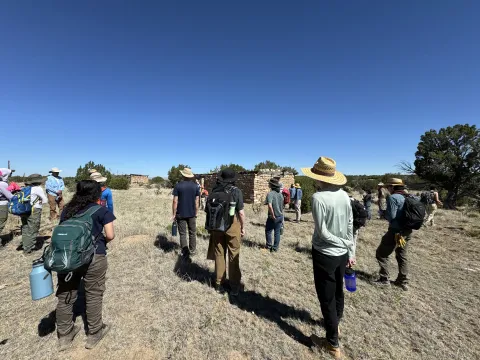
Area of Specialization Options
Students planning to do graduate work in the CHERM Master’s Program must choose one of the following areas of specialization.
Cultural Resource Management (CRM): Cultural Resource Management is a field that focuses on identifying, evaluating, and preserving archaeological sites, historic structures, and cultural landscapes in compliance with local, state, and federal legislation like NHPA and NEPA. CRM professionals work in government agencies, environmental firms, and heritage management organizations to assess cultural resources, mitigate impacts from development projects, and consult with stakeholders and indigenous communities. With 90% of archaeology careers in CRM, this specialization offers strong job prospects for graduates that give students a competitive edge in the job market.
Heritage Interpretation and Museum Practice: Heritage Interpretation and Museum Practice is an area of emphasis that trains students to engage the public with cultural and environmental heritage through exhibits, education programs, and interpretive media. Students gain skills in museum curation, collections management, exhibit development, and public programming, preparing them for careers in museums, heritage sites, and cultural tourism organizations. This focus area highlights the important role of museums and heritage interpretation in fostering stewardship and appreciation of our cultural and environmental resources.
Environmental Resource Management: Environmental Resource Management is a specialization that equips students with the knowledge and skills to assess, protect, and sustainably manage natural resources within the context of environmental resource management. Students learn to conduct environmental impact assessments, use geospatial technologies like GIS and remote sensing, navigate environmental policy and regulations, and engage with diverse stakeholders to develop holistic resource management strategies. Graduates are prepared for careers in environmental consulting firms, government agencies, and non-profit organizations working at the intersection of natural and cultural resource management.
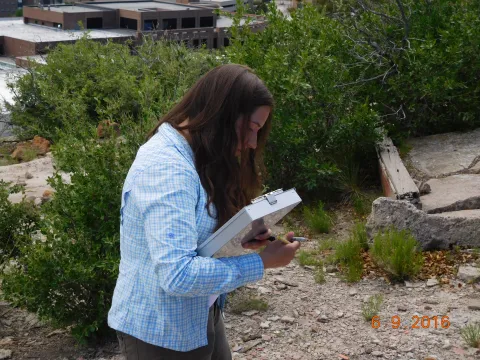
Program Requirements
The following are the minimum standards for admission of students to the MA in Cultural Heritage and Environmental Resource Management degree program:
- Hold a baccalaureate degree or a master's degree from an accredited college or university, or demonstrate completion of work equivalent to the baccalaureate or master's degree given at this university.
- Has an undergraduate cumulative GPA of 3.00 or higher for regular admission or GPA of 2.75-3.00 for provisional admission. ("A" is equal to 4.0).
Application Process: Please note that all applications are now handled electronically, and the application can be accessed here on the UCCS Graduate School website.
- Fill out the UCCS Graduate School application
- Include a statement of interest*.
- Provide three letters of recommendation (at least 2 of which should be able to address your academic or research potential).
- Provide copies of official transcripts from all institutions attended.
* What should your personal “Statement of Interest” consist of? We ask students to address the following topics and questions in their personal statement of interest: 1) a brief personal background that outlines your academic and/or relevant work experience 2) What past experiences have prepared you for graduate school? 3) What are your areas of interest and potential research topic? 4) Which graduate faculty do you hope to work with and why? 4) How will the CHERM MA program help you achieve your future goals? (See Letter to Prospective Students on our website for additional information.)
Application Deadline**: January 20 for Fall semester admission.
**Exceptions may be made for Spring admittance (discuss with the Graduate Director)
Benefits of a Fall term start include more options for funding and the sequence of required courses
International students: CHERM welcomes you! We will accept either path for demonstrating English proficiency for non-native English speakers seeking admission to the program:
- Bachelors or post-secondary degree from a US-accredited institution or program where English is the language of instruction, or
- Demonstrated proficiency in English with earned scores of 100 on the TOEFL, 7 on the iELTS, or 120 on Duolingo.
Prerequisite Courses
All entering graduate students are required to have the kind of knowledge presented in either the Anthropology or the Geography and Environmental Studies department’s introductory courses. It is the responsibility of the student to obtain this knowledge. If students are lacking in any prerequisite courses, students will work with their advisors to determine the appropriate action needed to fulfill the prerequisites.
Students may gain the required knowledge by formally taking the introductory courses listed in the appropriate department’s undergraduate requirements, by auditing the courses, by reading the textbooks, or by any other means agreed to with the graduate advisor. This knowledge will enhance the student’s ability to perform at the level expected in the graduate courses and seminars. Students are encouraged to have some background in college math, statistics, and computer skills.
Program Coursework
To earn the Masters of Arts in Cultural Heritage and Environmental Resource Management, students must complete 30 credit hours, including core courses, electives, and a capstone experience. The program is designed to be completed in 4 semesters of full-time study, but part-time options are available.
Cultural Heritage and Environmental Resources Management core followed by elective paths in cultural heritage, environmental heritage, public interpretation. Each student will also complete an internship and thesis project.
Core Curriculum: (18 credits)
The core curriculum will provide students with the foundational history, theory, law, and practice of heritage management. Most of these classes need to be developed but could include:
- ANTH 5180: Archaeology in the Public: Heritage Law, Ethics, and Community Engagement (3 credits)
- ANTH 6250: Project Management for Cultural Heritage and Environmental Resource Stewardship (3 credits)
- TCID 5080: Advanced Professional and Technical Writing (3 credits)
- Theoretical foundation course, choose one of:
- GES 5770: History and Nature of Geography (3 credits)
- ANTH 6600: Archaeological History and Practice (3 credits)
- ANTH/MSGP 5001: Museum History, Theory, and Practice (3 credits)
- GES or ANTH 7000: Capstone* Thesis or Project (6 credits)
Electives (12 credits - must choose at least 6 credits from Methods elective courses and 6 credits from Topical elective courses)
*Capstone Experience: Students complete either a thesis or an internship and capstone project to apply their knowledge and skills in a professional setting.
Program Policies and Procedures
Grade and Progress Policies
A grade of B- in a UCCS class is the lowest grade accepted towards the degree. Students will be automatically terminated from the program if they do not receive a B- or above in the theoretical foundation core course.
Students whose GPA falls below 3.0 will be placed on academic probation and will not qualify to graduate. Students placed on academic probation have 2 semesters to meet the requirements necessary to be removed from probation (bring GPA up to 3.0) or else suspension proceedings begin.
Student progress will also be monitored through the timely defense of a thesis proposal (completed within 4 semesters of enrollment) and the timely completion of a thesis (completed within 6 semesters of enrollment). If these benchmarks are not met, students will be required to meet with their academic advisor and/or the graduate director to discuss and outline a written strategy for the successful completion of the degree. Students have a maximum of five years to complete their degree. A one-year extension can be given if a student demonstrates that he/she is actively working on their research and has a written strategy to complete the thesis. However, the Graduate School has a six-year time limit that cannot be superseded. According to Graduate School rules, a petition for extension must be filed at the end of the fifth year to continue. This petition comes to the CHERM graduate advisor, but ultimate approval must come from the Dean of the Graduate School.
Other professional development activities (conference attendance, presentation, and publication) will be strongly encouraged, but are not officially monitored as part of the student progress policy.
Student Handbook and Annual Report Template
CHERM MA Handbook
CHERM MA Annual Activities Report Template
UCCS Graduate School Policies and Procedures
Thesis Proposal Presentation and Defense Evaluation Forms
CHERM Thesis Proposal Evaluation Form
CHERM Thesis Defense Evaluation Form
Graduating This Semester?
UCCS Application for Candidacy Form
- Follow UCCS Graduate School's guidelines and
- Fulfill the schedule of deadlines for degree candidates
Additional graduate student resources are available on the Graduate School website.
CHERM MA Timeline
Sample 2-Year Degree Plan MA
Year One | √ | FALL | Hours | √ | SPRING | Hours |
| ANTH 6250: Project Management for CHERM | 3 |
| ANTH 5180 Archaeology in the Public | 3 | |
| Discipline Specific Core: Choose 1 | 3 |
| TCID 5080: Advanced Professional and Technical Writing | 3 | |
| GES 5770, ANTH 6600, ANTH/MSGP 5001 |
|
| Methods/topical Elective | 3-4 | |
| TOTAL | 6 |
| TOTAL | 9-10 | |
| Other actions to take ensure progress:
|
|
| Other actions to take ensure progress:
|
| |
|
|
| ||||
Year Two | √ | FALL | Hours | √ | SPRING | Hours |
| Topical Elective | 3-4 |
| Methods/topical Elective | 3-4 | |
| Methods Elective | 3-4 |
| Capstone/Thesis Hrs. | 3 | |
| Capstone/Internship Thesis Hrs. | 3 |
| TOTAL | 6-7 | |
| TOTAL | 9-11 |
|
|
| |
| Other actions to take ensure progress:
|
|
| Other actions to take ensure progress:
|
| |
During your final semester you should also:
- Submit Application for Admission to Candidacy for an Advanced Degree by the deadline
- Share thesis with Thesis Committee 2 weeks prior to Defense
- Schedule & defend thesis prior to graduate school deadline
- Upon successful defense of the thesis submit the thesis to graduate school graduate school deadline
Graduate Faculty
In Anthropology and Museum Studies:
Dr. Colin Wren – Data and database management, GIS, quantitative analysis, spatial data analysis
Dr. Karin Larkin – Museum practice and theory, archaeological laboratory and field techniques, work with descendant communities, public archaeology ethics and law, Colorado and US Southwest/NW Mexico archaeology, material culture studies, archaeology of recent past, cultural resource management.
Dr. Minette Church – Museum studies, material culture studies, archaeology history and theory, plains and borderlands archaeology and history, cultural resource management, archival research methods, ethnobotany, landscape archaeology, decolonizing approaches, site interpretation, archaeology of recent past
In Geography and Environmental Studies:
Dr. Christine Biermann: Forest conservation and management, and dendrochronology
Dr. Diep Dao: Spatial analysis and modelling, GIS, data management, mapping and spatial visualization
Dr. Cerian Gibbes: remote sensing, land use and ecosystem analysis and change, ecosystem services
Dr. John Harner: GIS and cultural landscape analysis, historical geography, architecture, urban stakeholders
Dr. Dylan Harris: intersections of nature and society, climate and environmental change, and energy, power and social justice
Dr. David Havlick: laws, policies, and uses of federal and military lands, ethics of restoration, tourism/recreation and impacts on land use and conservation
Dr. Curtis Holder: water cycles, policies and utilization, spatial distribution of plants and animals
Dr. Brandon Vogt: geomorphology, mountain meteorology / microclimate, mountain systems
Dr. Fuzhen Yin: Geographical Information Science (GIScience); Geospatial Artificial Intelligence (GeoAI); Urban Complexity and Agent-Based Modeling; Social Network Analysis; Crisis Response, Informatics and Disaster Resilience Urban Geography
Letter to Prospective Students
Dear Prospective Student,
Thank you for your interest in our innovative and interdisciplinary Cultural Heritage and Environmental Resource Management (CHERM) Masters of Arts program. This program will help you prepare for a career at the intersections of Cultural Resource Management, Environmental Protection, Heritage Tourism, Museum Studies, and Cultural Preservation. As CHERM graduate students, you will have the opportunity to work alongside faculty members from the Departments of Anthropology and Geography and Environmental Studies to develop your interests, career prospects, and skills. Below are answers to common questions:
Why should I pursue a graduate degree? Earning a graduate degree has many benefits. Here are seven potential reasons to earn a Master of Arts in CHERM at the University of Colorado Colorado Springs:
- Personal growth
- Greater employment opportunities
- Career advancement
- Possible financial rewards
- Sense of accomplishment
- Greater recognition and credibility
- Interdisciplinary curriculum
How do I know if this is the right program for me? If you are passionate about cultural heritage and/or environmental resources and are interested in pursuing a career in Cultural Resource Management, government agencies, museums and heritage sites, non-profit institutions, private sector environmental management firms, or state or national parks, this degree will give you a competitive edge in the job market.
How do I determine if this interdisciplinary program is a good fit for my interests and goals? Explore the topics that UCCS Anthropology and Geography departments focus on by exploring the graduate faculty for each and see what they address in their research. Feel free to identify a potential advisor that aligns with your interests and goals and contact them with questions.
Can I take classes as an unclassified student? This is an individual choice, and comes with the understanding that admittance to the program is not guaranteed and that tuition dollars are not reimbursed. Generally, we encourage students to follow the stated program requirements, which are available on the website.
Can I complete the program while working full-time? Yes, many students successfully complete their MA degree while working full-time. However, it is important for students to prioritize their studies and the MA program. For those students applying to go to graduate school while remaining in full-time employment, we encourage you to consider carefully how you will ensure balance between your work responsibilities, life, and your graduate studies. While we work to be flexible, many of our classes are only offered during regular working hours (9am-5pm), are often offered only one day a week, and attendance is required. Students who work full-time will need to work with their employer to ensure they can attend all required class meetings.
How much will the program cost and how do I establish residency? Students must establish residency to ensure proper tuition fees are charged. Information regarding tuition classification and residency requirements can be found on the UCCS Registrar's website.
What kind of financial aid is offered? The UCCS Financial Aid Office assists with student loans, work-study qualifications, and potential student grant money. Information regarding financial aid can be found on the UCCS Financial Aid website. There are many avenues to pursue to supplement or cover educational expenses. There are numerous firms in Colorado that hire our students. Most will be flexible with work and school schedules, some offer tuition reimbursement, and some have internship programs with our departments. Additionally, AmeriCorps provides educational stipends to students. For more information discuss these options with the Graduate Director or other GES faculty members.
What should your personal “Statement of Interest” consist of? We ask students to address the following topics and questions in their personal statement of interest: 1) a brief personal background that outlines your academic and/or relevant work experience 2) What past experiences have prepared you for graduate school? 3) What are your areas of interest and potential research topic? 4) Which graduate faculty do you hope to work with and why? 5) How will the CHERM MA program help you achieve your future goals?
How can I indicate my interest on a study specialization? You indicate your preferred specialization on your graduate school application under the “Area of Specialization” statement, and the decision about whether to accept you to a program is typically made by faculty members in that particular area. The assignment of your initial advisor will also be based on your statement. The recommended format for the “Area of Specialization” statement is to:
- Begin with a paragraph stating your broad areas of interest and then identify potential issues and research focus.
- Include a second paragraph that identifies specific graduate faculty and coursework at UCCS that will help you gain expertise in a specific specialization.
- Conclude with a final paragraph describing how a specific focus will help you achieve your career goals.
We welcome your interest in the Master of Arts in CHERM. If you have further questions or concerns, please feel free to contact the Graduate Director.
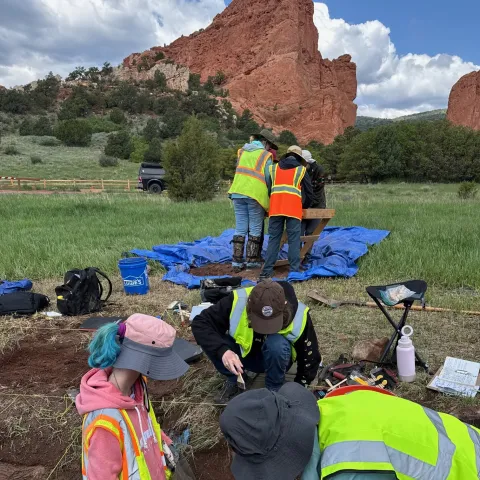
Funding
Students may qualify for a variety of fellowships, scholarships, and grants from the Graduate School. Information regarding funding can be found on the UCCS Graduate School website.
Department Funding
Students may qualify for departmental funding on a competitive basis. Below are current options for funding in the Departments of Anthropology and Geography and Environmental Studies:
- Teaching Assistantship: One TA is funded each year on a competitive basis. A call for nominations from faculty is sent out in mid-February for both new and returning students.
- Research Assistantship: A limited number of students receive funding from faculty members through research grants in which they are research assistants (RA). This source of income is variable, depending on grants that individual faculty members have at any given time. Please contact whomever you think might be your advisor for information on possible research funding opportunities. Recognize that the availability of these positions varies greatly and is not guaranteed.
- Geography graduate scholarships: These scholarships are awarded twice a year on a competitive basis. A call for applications will be sent out to both new and returning students.
- Western State Resident Tuition Classification Program in: Residents from AK, AZ, CA, HI, ID, MT, NV, NM, ND, OR, SD, UT, WA, and WY are eligible to pay in-state tuition rates for the MA in Applied Geography Program. The benefit is automatically applied to qualified students' tuition bills based on their legal residency (more information).
Facilities
Facilities for the program are housed in the departments of Anthropology and Geography. Our existing resources include our well-appointed laboratories and current faculty expertise. Laboratories include:
- Cultural Anthropology and Linguistics laboratory
- Bio-anthropology and forensics laboratory
- GIS laboratory and classroom
- Geomorphology Research Laboratory
- Human Osteology collection
- Archaeology laboratories
- Seyhan Dwelis Curation Facility
- Tree Ring Laboratory
- Forest Hydrology Research Laboratory
